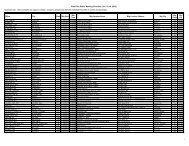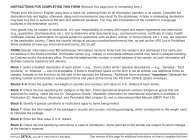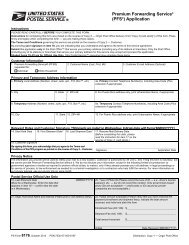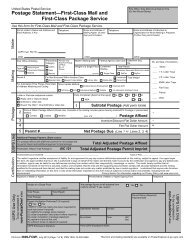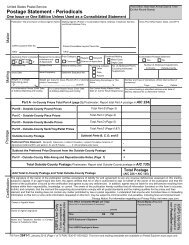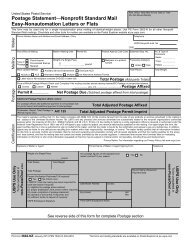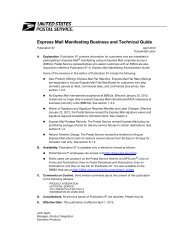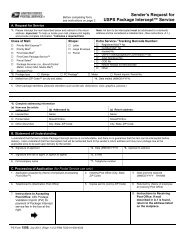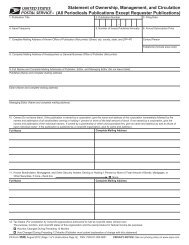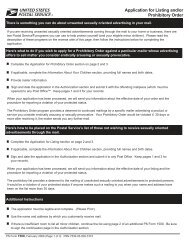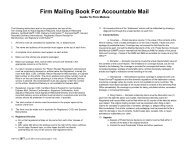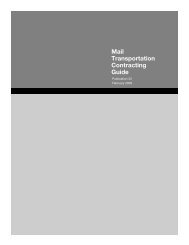Postal Bulletin 22144 - December 23, 2004 - USPS.com
Postal Bulletin 22144 - December 23, 2004 - USPS.com
Postal Bulletin 22144 - December 23, 2004 - USPS.com
You also want an ePaper? Increase the reach of your titles
YUMPU automatically turns print PDFs into web optimized ePapers that Google loves.
6 POSTAL BULLETIN <strong>22144</strong> (12-<strong>23</strong>-04)<br />
Common Work-at-Home Schemes<br />
Con artists know working at home sounds attractive. That’s why they place such ads. Here are some of the more <strong>com</strong>mon<br />
fraudulent work-at-home opportunities:<br />
Envelope stuffing: In this scam, promoters offer a money-making opportunity stuffing envelopes at home — for a<br />
“small fee.” But victims do not receive a job. Instead, the victims pay the promoter who then provides them with the<br />
details of the scheme. The details are simple: contact other potential “employees” with an offer to make money stuffing<br />
envelopes and then sell the new recruits the details of the scheme. Typically, there is nothing to stuff. The fraud depends<br />
on the continuous recruitment of people to whom the sponsor can offer the same plan. The reality is that the<br />
envelope stuffing process has be<strong>com</strong>e a highly automated and mechanized operation. Businesses use sophisticated<br />
<strong>com</strong>puter software and mail-processing equipment to generate addresses and insert letters into envelopes. This eliminates<br />
any profit potential for an individual doing this type of work at home. <strong>Postal</strong> Inspectors know of no work-at-home<br />
envelope stuffing promotion that ever produces in<strong>com</strong>e as promised.<br />
Product assembly and craft work: These programs often require victims to buy supplies and instructions for assembling<br />
simple toys or other products in their home. The victim spends many hours producing items such as baby booties,<br />
plastic signs, or toy clowns for a <strong>com</strong>pany that has promised to buy the products. However, after the victim has purchased<br />
the supplies and equipment and has performed the work, the promoter often decides not to pay because the<br />
work does not meet certain “quality standards.” Unfortunately, with these promoters, no work ever meets their<br />
“standards,” and the victim is left with merchandise that is difficult or impossible to sell. With no market for the product,<br />
the victim wastes time and money.<br />
Reshipping: These scams involve the receiving and reshipping of merchandise often ordered online to locations that<br />
are usually overseas. The work-at-home shipper is told that he or she can make substantial amounts of money by<br />
receiving, repackaging, and then mailing the merchandise to the foreign addresses. However, the shipper is unaware<br />
the merchandise has been paid for with stolen or fraudulent credit cards. In effect, the shipper be<strong>com</strong>es part of a fencing<br />
operation by receiving stolen goods and then mailing the goods to the promoter. The promoters, often based in a<br />
foreign country, are outside the reach of U.S. law enforcement and are able to cover their tracks to evade capture. The<br />
victim, however, is easily tracked and implicated in the crime.<br />
This fraudulent work-at-home scam presents other drawbacks. Individuals attracted to work-at-home employment<br />
through advertisements posted on popular Internet job Web sites often are required to provide personal information.<br />
This means the prospective “employee” might be asked to submit Social Security Number, date of birth, and sensitive<br />
bank account information. Once “employees” are hired, they immediately begin receiving packages for reshipping at<br />
their residence. Unfortunately, the promoter now has personal information about the new “employee” which often is<br />
later used in identity fraud.<br />
Another drawback is the “pay.” Payment to employees usually arrives in the form of a third-party cashier’s check, rather<br />
than a regular paycheck. The check often is larger than the payment due to the employees for their reshipping services.<br />
The employee is instructed to cash the check and electronically forward the excess amount to an overseas bank<br />
account. Ultimately, the bank will discover the cashier’s check is bogus, and the victim will be liable for repaying the full<br />
amount of the check. At this point, “employees” realize they have not only fallen victim to a scam, but that the operators<br />
of the scam now possess their personal information.<br />
Multilevel Marketing: Multilevel marketing, a direct sales system, is a well-established, legitimate form of business<br />
often promoted as a work-at-home opportunity. Many people have successfully sold the products of reputable <strong>com</strong>panies<br />
to their neighbors and co-workers. These people are independent distributors who sell popular products and also<br />
recruit other distributors to join them. On the other hand, illegitimate pyramid schemes can resemble these legitimate<br />
direct sales systems. An obvious difference is that the emphasis is on recruiting others to join the program, not on<br />
selling the product. For a time, new recruits who make the investment to buy product samples keep money <strong>com</strong>ing into<br />
the system, but very few products are sold. Sooner or later, the people on the bottom of the pyramid scheme are stuck<br />
with a saturated market, and they cannot make money by selling products or recruiting. When the whole system collapses,<br />
only a few people at the top have made money — and those at the bottom have lost their investment.




